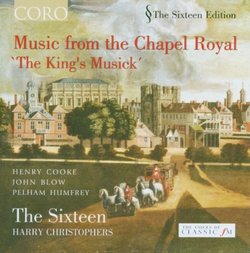| All Artists: John Blow, Henry Cooke, Pelham Humfrey, Various Composers, Symphony of Harmony & Invention, Sixteen, Harry Christophers Title: Music from the Chapel Royal 'The King's Musick' Members Wishing: 0 Total Copies: 0 Label: Coro Original Release Date: 1/1/2006 Re-Release Date: 10/10/2006 Genres: Pop, Classical Styles: Vocal Pop, Opera & Classical Vocal, Historical Periods, Baroque (c.1600-1750), Sacred & Religious Number of Discs: 1 SwapaCD Credits: 1 UPC: 828021604126 |
Search - John Blow, Henry Cooke, Pelham Humfrey :: Music from the Chapel Royal 'The King's Musick'
 | John Blow, Henry Cooke, Pelham Humfrey Music from the Chapel Royal 'The King's Musick' Genres: Pop, Classical Brand-new recording from The Sixteen (recorded in 2006) features new editions and world premiere recordings. It was largely through the efforts of "Captain" Henry Cooke (c.1615-1672) that the choir of the Chapel Royal w... more » |
Larger Image |
CD Details
Synopsis
Album Description
Brand-new recording from The Sixteen (recorded in 2006) features new editions and world premiere recordings. It was largely through the efforts of "Captain" Henry Cooke (c.1615-1672) that the choir of the Chapel Royal was successfully restored at the Restoration in 1660. He invoked ancient press-gang legislation to purloin promising choirboys from cathedrals across the country. Two of them, Pelham Humfrey and John Blow, went on to write groundbreaking music. John Blow subsequently resigned his post as organist of Westminster Abbey in favor of his own pupil Henry Purcell, only to assume it again on Purcell's untimely death. Cooke's most important service to English church music was to put into practice Charles II's explicit desire to have his royal anthems decked out with instrumental "symphonies" and interludes. The diarist Samuel Pepys regularly recorded the performances of Cooke's novel new anthems by the Chapel Royal choir. Originally the Chapel Royal referred to a group of singers and clergy serving the spiritual needs of England's sovereign, but later the term became attached to a building as well; several buildings, in fact, of which the Chapel Royal within St. James's Palace, London (built 1702), is the one most often meant. The famed choir of the Chapel Royal achieved its zenith during the reign of Elizabeth I, when William Byrd and Thomas Tallis were both organists there.
